With the spring semester on campus abruptly cut short by the novel coronavirus, the members of the red class of 2020 have missed many of the time-honored traditions around graduation: senior week festivities; a big tent crowded with family, friends, faculty, and polyester robes; triumphant marches across the stage that neatly end a shared chapter in their lives. Before leaving campus, the class staged an emotional “faux-mencement,” pictured here. In lieu of a commencement address, we offer the following words of comfort, support, and solidarity from five members of the Wellesley community. We know that nothing can replace the time on campus that ’20 missed, but we hope that they find solace in the knowledge that wherever they are in the world and wherever their lives take them, Wellesley will be there.
Wendy Judge Paulson ’69
Students of the class of 2020, you have spent the better part of four academic years immersed in beauty—the beauty of learning and teaching, new discoveries, expanded horizons, creativity, deepened understanding, friendships.
There’s another expression of beauty that has embraced you during your tenure at Wellesley: the beauty of the campus.
The opportunity to walk to classes along curved footpaths, meander back to your dorm in any number of ways, pause on the boardwalk over Paintshop Pond to listen to the songs of yellow warblers and red-winged blackbirds, or take a long walk around the lake by yourself or with friends has been a daily gift that often is not fully obvious until you leave it. You have been blessed to have lived and studied these past years on a campus of uncommon natural diversity and beauty.
That fact may seem irrelevant or trivial in the face of many challenges, whether they be on a global scale like the pandemic that precipitated your untimely departure from the campus, or of an individual nature. But it is not irrelevant. The beauty of place that you have experienced is a benediction to cherish and build on as you scatter across the planet to pursue careers and develop your individual interests.
‘You need not be a biologist, naturalist, or conservationist to support the stewardship of nature—to care for it, as nature cares for us.’
—Wendy Judge Paulson ’69
I appreciated the natural aesthetic of the Wellesley campus while I was there, but I didn’t realize its deeper impact until much later. When I was troubled about a personal issue, or felt unmotivated in my work, or simply needed to think, I headed outdoors. Marveling at the autumn palette of maples and oaks, standing at the edge of Lake Waban during a winter snowfall, drinking in the tranquility and beauty of the campus brought solace and perspective that I sorely needed. I was discovering that nature held a depth of meaning—and healing—that has developed into lifelong involvement in nature education and conservation.
I’ve learned in the decades since I left Wellesley that nature has an extraordinary power to comfort, uplift, inspire, educate, intrigue, and delight. It should come as no surprise that in this time of pause and confinement, people the world over are sharing photos and stories of natural phenomena many had never noticed before: the exquisite unfurling of blossoms, the trill of frogs, the migration of birds on epic annual journeys. The species vary from hemisphere to hemisphere and country to country, but they all are part of the wondrous diversity of life on Earth. Many are discovering a need for nature they never knew they had, even as research confirms that time in nature nourishes physical, mental, emotional, and spiritual health.
Your graduation year coincides with that of the 50th anniversary of Earth Day. It’s an opportune moment to reflect on the natural context for your undergraduate career—a context that the founding Durants deliberately provided to nourish an excellent education—and consider your role in protecting and conserving nature in the communities and cities where you will live and work. You need not be a biologist, naturalist, or conservationist to support the stewardship of nature—to care for it, as nature cares for us.
Wendy Judge Paulson ’69 is a nature educator and serves as trustee or adviser for multiple conservation organizations, both domestic and international. She established the Paulson Ecology of Place Initiative at Wellesley to spark more intentional integration of the campus into all academic disciplines.
Jasmine Guillory ’97
Congratulations, class of 2020! I am so proud of all of you. We, Wellesley alums from near and far, from so many generations, are so proud of all of you. You accomplished something incredible, and I hope you’re proud of yourselves. You graduated from Wellesley College, not an easy feat at any time, and at all times something to celebrate. Not only that, but you did it in the middle of one of the hardest things any of us have had to live through. This is an incredible achievement, and I hope you recognize that.
I wish so much that Wellesley could celebrate you with the commencement ceremony you deserve, and I hate that we can’t right now. It’s OK to grieve what has been taken away from you; this end to your college career isn’t what any of us would have wanted for you, and I’m so sorry for that. But please know that, no matter what, you will always have Wellesley, and that the community of your fellow Wellesley alums will be there for you.
I have had many hard times in the 23 years since my Wellesley commencement, and Wellesley has helped me through them all. Wellesley will be there for you during your struggles, your grief, your sicknesses, your hardships of all kinds. And Wellesley will be there for you when you fail—yes, fail—even Wellesley alums do. I would argue that especially Wellesley alums do, because we are only able to succeed if we put ourselves out there and take risks, and sometimes those risks don’t pan out. One of the things I’ve learned since my Wellesley graduation is the ability to deal with failure, to take those risks, to try something I may not be good at, to fall down, and to pick myself back up again. Please don’t be embarrassed by your failures, or think that your Wellesley family doesn’t understand—I promise, we do. When I failed the bar exam as an aspiring attorney, when I’ve lost jobs, when I despaired for my future, Wellesley was always there for me. With shoulders to cry on, hugs, pep talks, and useful advice and crucial connections that helped me pick myself up and keep moving forward.
But Wellesley is also always—always—there to celebrate my successes with me, and to multiply my joy. The success of my books have far and away surpassed my wildest dreams, but when my first book came out 2½ years ago, I had no idea what the reception for it would be. I am so grateful for Wellesley alums who have supported me, cheered for me, and celebrated me and my books every step along the way. Of the more than 60 book events I’ve done in the past 2 ½ years, Wellesley alums have been to at least 50 of them. We aren’t that big of a school! There aren’t that many of us! But from California to New York, from Minnesota to Arizona, from Texas to North Carolina, Wellesley has always been there for me.
We, Wellesley, will be there for you, class of 2020. Always.
After Wellesley, Jasmine Guillory ’97 earned a J.D. at Stanford Law School. She had practiced law for 10 years when she started writing—first as just a hobby, then as a passion, then, after years of hard work and rejection, as a career. She is now a New York Times bestselling author of five romance novels. Her fifth book, Party of Two, came out in June.
Heather Long ’04
It’s OK to feel a little sad that spring 2020—and graduation 2020—isn’t anything close to what you envisioned. I can kind of relate. As you read this, I was supposed to be on my honeymoon, a last big adventure before my husband and I try to have a child. We tell each other the trip is just … delayed. But we’re realizing it might not happen.
I’ve had a few moments of self-pity, of sitting on my couch eating too many mint creme Oreos. I’ve then berated myself for being so self-centered at a time when friends, including someone in my extended family, have lost loved ones to COVID-19, and they can’t even have a funeral. It’s OK to feel that range of emotions.
Class of 2020, these are not easy times. And they are unlikely to get rosier. Many of you have known tough situations. You were born shortly before 9/11. Your childhood was impacted by the Great Recession. Now, you leave college during a deadly pandemic. For nearly your entire life, America has been at war. And countless natural disasters and refugee crises have also occurred, not to mention climate change.
But you have something unique: A Wellesley education and a Wellesley family. In the midst of this crisis, younger alums have checked on older alums. They’ve organized Zoom reunions and mask-making initiatives. Wellesley grads have brought quarantined alums food and supplies, and they’ve advocated for better policies at hospitals and at the local, state, and national levels.
You are now a Wellesley alum. You are part of this family. Your first task is to keep yourself and your loved ones safe. When you are able, check in on friends. Build networks. Reach out. Then find that issue you want to fight to change. None of us can solve every problem—or even most of them. But we can use our gifts—and education—to help in our own ways.
For me, that calling has taken me into journalism. I am an economics correspondent at the Washington Post. Right now, I am chronicling the worst economic crisis since the Great Depression. My apartment is a mess. Some days, I don’t shower. I have no home office, so I type on my bed, much as I did in McAfee and Tower dorm rooms. I record podcasts from my closet.
In moments of doubt, I think about Mamford, a Lyft driver I met shortly before President Trump declared a national emergency on March 13 and much of the nation went into lockdown. We text and talk from time to time. He stopped driving. He still hasn’t been able to get unemployment. He’s worried about losing his car. He always asks me, “Do you still have a job?” He’s right. I’m lucky I can work from home. I am fighting for Mamford and about 30 million Americans who lost jobs during the pandemic through my stories and questions to lawmakers and corporations. Class of 2020, what will you do?
This isn’t the year any of us envisioned, but we’ll help each other through it, and most importantly, we will ensure this never happens again.
Heather Long ’04 got her start writing about economic issues in Professor David Lindauer’s Economic Journalism class her senior year. She has worked for CNN, the Guardian, the Patriot-News, and the Washington Post.
Claire Ayoub ’11
My name is Claire Ayoub, and I’m a proud member of the golden class of 2011. I’m also a comedy writer and director, which means I’ve had a lot of other jobs in the past nine years.
Now I’m making my first movie. Empire Waist is my comedy about teen girls learning to love their bodies through fashion design. It began in 2014 as an essay for Amy Poehler’s Smart Girls, in which I begged my 12-year-old self not to quit swimming just because she had gained weight. It was the most vulnerable I had ever been in my professional writing. But it was my truth—and I wasn’t alone. The response was overwhelmingly positive as women from around the country and the world shared their own stories. At that moment, I knew I wanted to write a movie for us all.
In 2015, I wrote Empire Waist, a comedy about an overweight and deeply insecure teen girl with a gift for fashion design. She can make herself anything she wants to wear—but doesn’t feel worthy to wear it. It’s a story of self-love and the film I needed as a teen girl.
My entertainment managers were ecstatic. “This will make you millions! And female empowerment is so in right now!” My bank account was almost empty. I had moved to Los Angeles to make movies and TV, so it was exactly what I wanted to hear, right? So I promised them a second draft, quit doing comedy, and let the script sit in a folder on my computer marked “Hall Closet” for four years.
The fear of failure is a really powerful and debilitating thing. What if I fail? What if I fall? What if it isn’t worth it at all? Even when we get within arm’s reach of the things we want, it can be so difficult to avoid the negative thoughts telling us we’re not good enough.
Class of 2020, as you step out into your post-Wellesley world, my challenge to you is this: Try anyway. Even if you’re scared to take a leap or not sure you have the skills, try anyway. Whatever it may be, don’t count yourself out before you even try.
Four years after I promised that second draft of Empire Waist, I finally wrote it. I threw a party for my deadline, a live reading for 20 friends. And even though my brain screamed to cancel the reading, I tried anyway. I tried anyway as I held 16 live readings across the country. As I was flown out to Los Angeles and Sundance to workshop the script. As I met with industry executives who wanted to make my movie, with me as director. Even though I doubted myself every step of the way, I still tried.
It’s a small phrase, but it isn’t easy. It’s why I call the circles under my eyes my “emotional baggage.” But I can promise you: It will be worth it—and you won’t be alone. No one has cheered harder for me during my career than my 2011 classmates and the alum community at large. We support each other, not only during the great times, but the challenging ones, too. We are here for each other—and we are here for you.
After Wellesley, Claire Ayoub ’11 went into sketch comedy writing and directing in New York City—meaning she worked as a nanny, tutor, assistant, book editor, copywriter, commercial writer, Letterman joke writer, and many other writing jobs to make ends meet. She’s written for Amy Poehler’s Smart Girls, the New York Times, TNT, Comedy Central, and copyedits all her dad’s emails.
Timothy Peltason
When I was about 13 and reading J. D. Salinger’s Catcher in the Rye for the first time, I was struck by Holden Caulfield’s remark, after he gets kicked out of his third or fourth prep school, that he needs to walk around the place a bit, “trying to feel some kind of a good-by … I don’t care if it’s a sad good-by or a bad good-by, but when I leave a place I like to know I’m leaving it. If you don’t, you feel even worse.” Struggling with my own good-bye to the home my family was leaving, I knew just what he meant, and I was excited to discover that there were characters in books who knew so much about me and who could help me to lay hold of my feelings in words.
I offer you Holden now for his sympathetic insight into one source of the disorientation that we are all feeling in this strange season, and that you members of the class of 2020 have special reason to feel. We were all of us wrenched abruptly from the warm, familiar world of our routines into the socially distanced limbo that we currently inhabit. And we are all of us grieving this loss, you with particular reason and force. Although you and your teachers have worked hard to complete the intellectual work of the term, your viral and virtual senior springtime has not done for you its crucial therapeutic work. Senior spring is always a series of arrivals and losses, which is why it’s filled with rituals and observances that help you to process loss and to go forward. To go forward with whatever sense of sadness or eagerness, but with the sense, at least, that a momentous transition has been properly recognized and lived. But for you that process was cut abruptly short, before you could fully experience your season of transition or have the chance to feel your good-bye, and to feel it in the company of the friends and classmates with whom you have shared so much.
‘We stand with you, we stand for you, to recognize and to honor this great passage in your lives.’
—Professor Tim Peltason
It’s both a consolation and a complication that you are feeling this loss in the midst of so many other stresses and losses, some less profound than yours, some much more. I have attended two Zoom shivas in the last few weeks and wept there with and for the mourners who are also being denied by this strange, scary time their full participation in the necessary rituals of loss. But these more grievous losses don’t at all diminish your own right to be sad and mad about what you’ve missed. All of your teachers, and your class deans and residence staff, and everybody who has supported you here—we’re all sad and mad for you, and so much of our own work and email and Zoom talk over the past few months has been about you and about the great regret that we feel on your behalf. You are a part of many different and intersecting communities, and their concern for you, along with your concern and care for each other, is creating new kinds of rituals and new shared experiences. The other messages here, from your elder Wellesley siblings, should make clear the sympathetic warmth with which the whole Wellesley alumnae community is thinking of you, and the eagerness with which they are welcoming you into their ranks.
Wherever you go from this time and place, you will carry with you the special distinction—however dubious a distinction it may seem just now—of being members of the class of 2020 and veterans of the senior spring that wasn’t. As soon as you mention your graduation date to anybody anywhere, they will know what sets you apart, which is also what will bind you together. I’ll venture a guess that your five-year reunion will be exceptionally well attended, a great rite of return and deferred celebration. In the meanwhile, we hope that you will come back before then, and often. We wish you hearty congratulations on your unique and remarkable graduation from Wellesley. We wish health and every good thing for you and your families. And we stand with you, we stand for you, to recognize and to honor this great passage in your lives.
Tim Peltason teaches in the English department and has been a proud and grateful member of the Wellesley faculty for 43 years. He eagerly hopes to see Wellesley students returning to campus for at least some portion of his 44th and last year at Wellesley in 2020–21.




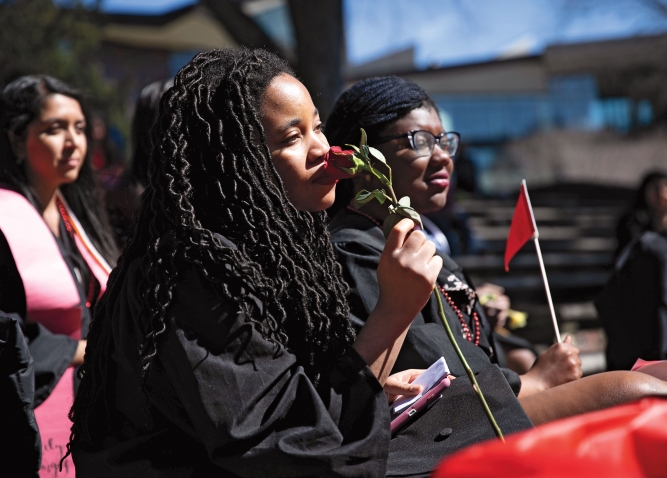

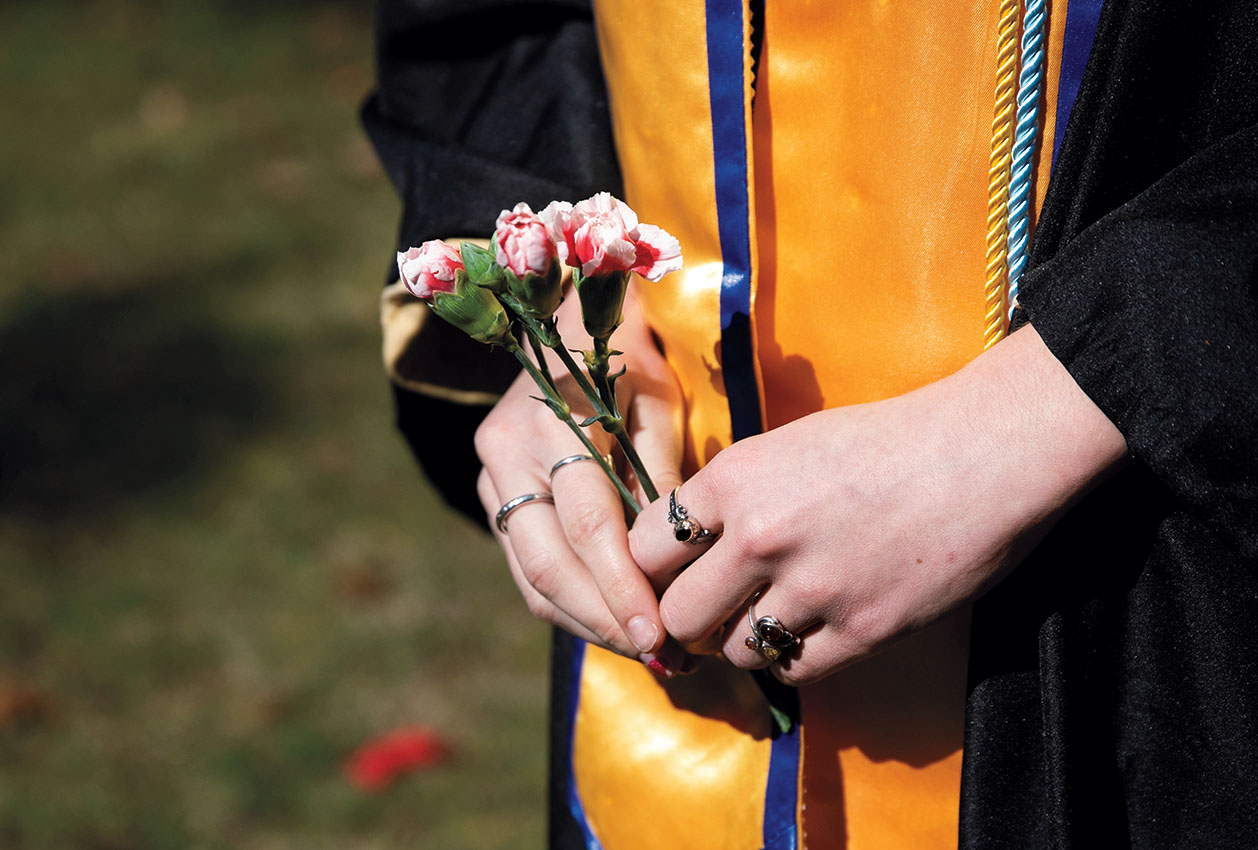

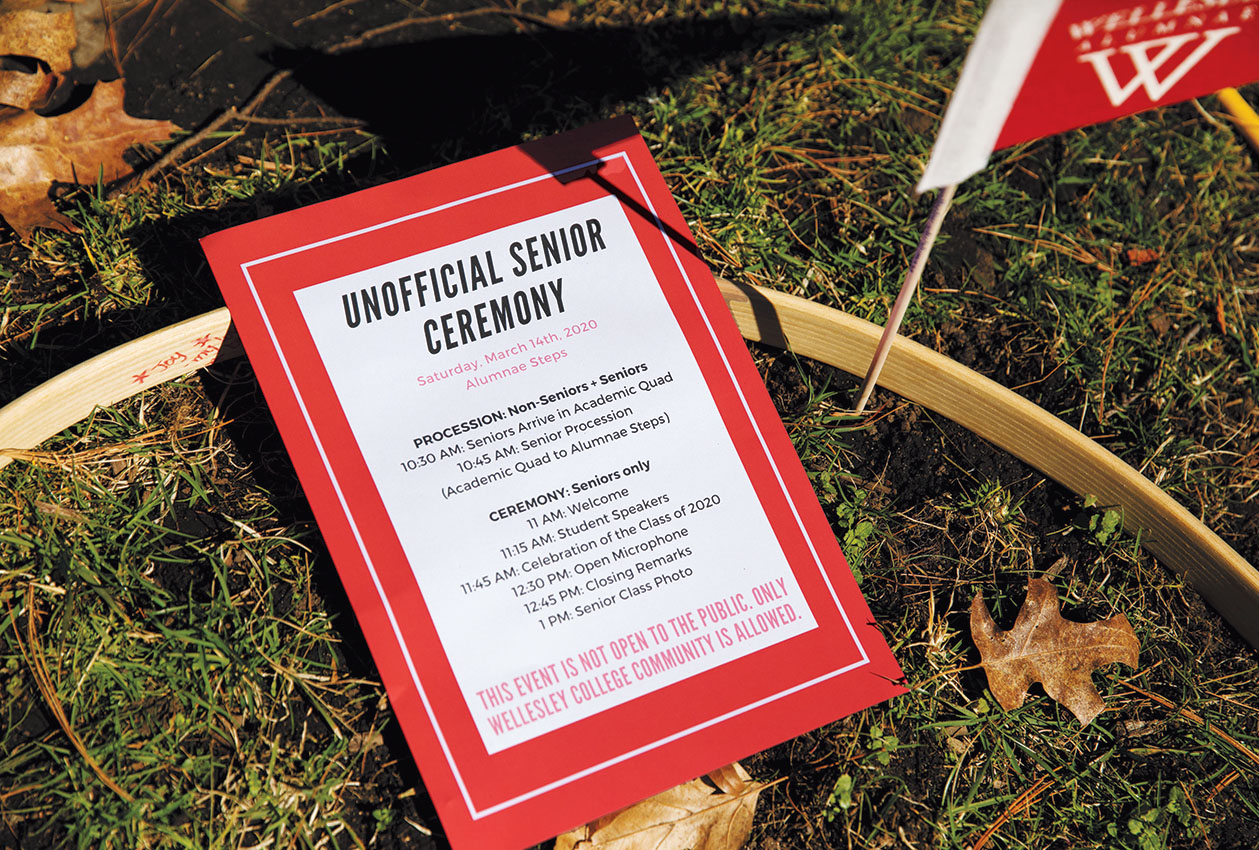
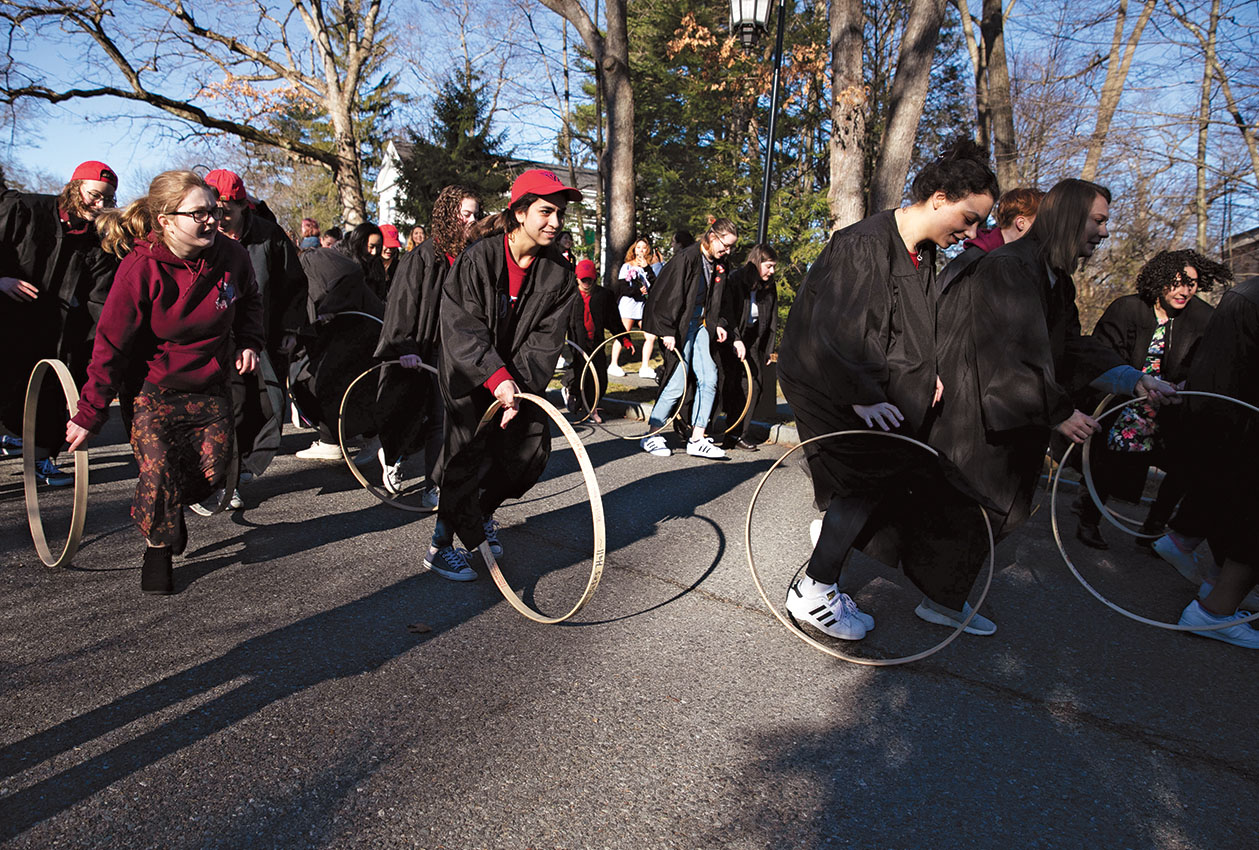
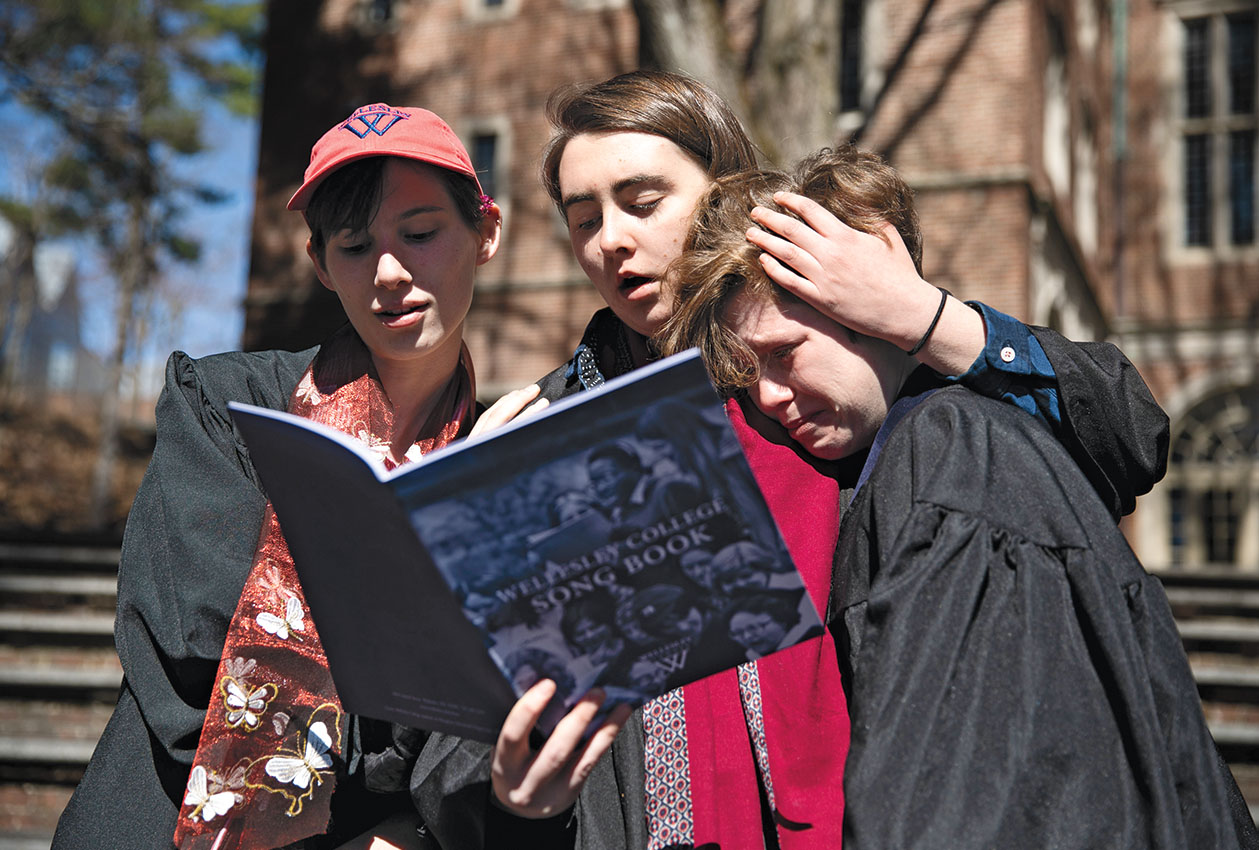

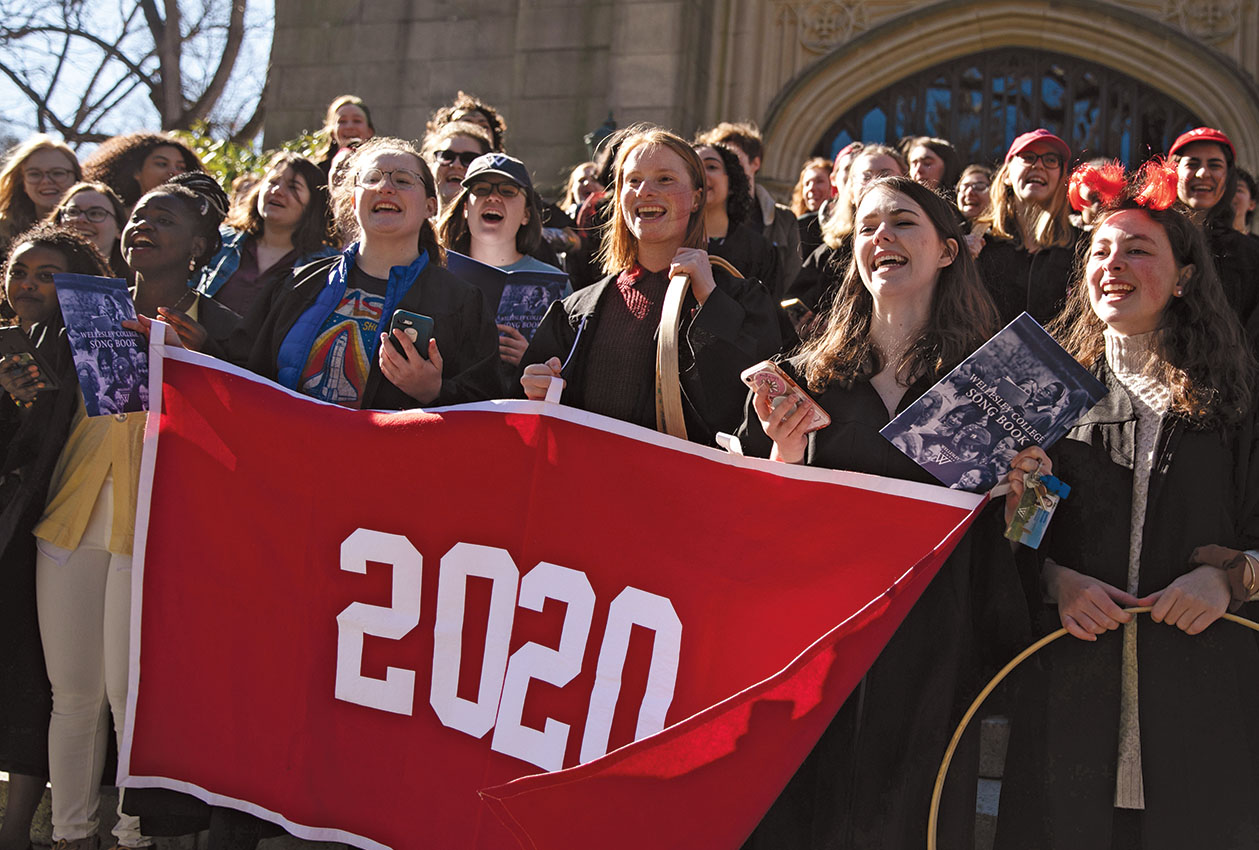
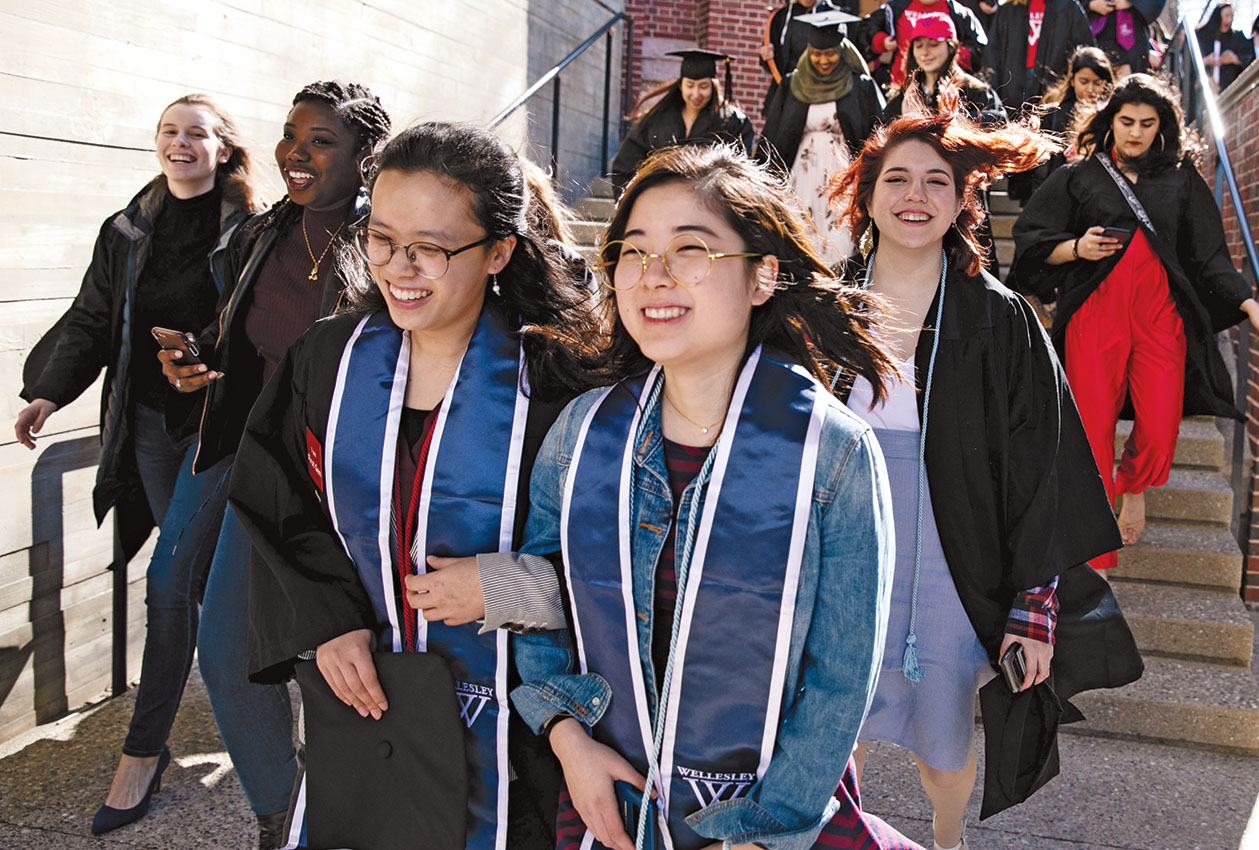
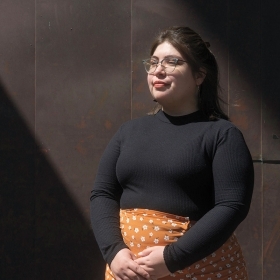
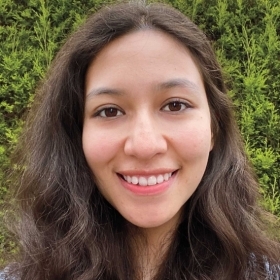

We ask that those who engage in Wellesley magazine's online community act with honesty, integrity, and respect. (Remember the honor code, alums?) We reserve the right to remove comments by impersonators or comments that are not civil and relevant to the subject at hand. By posting here, you are permitting Wellesley magazine to edit and republish your comment in all media. Please remember that all posts are public.